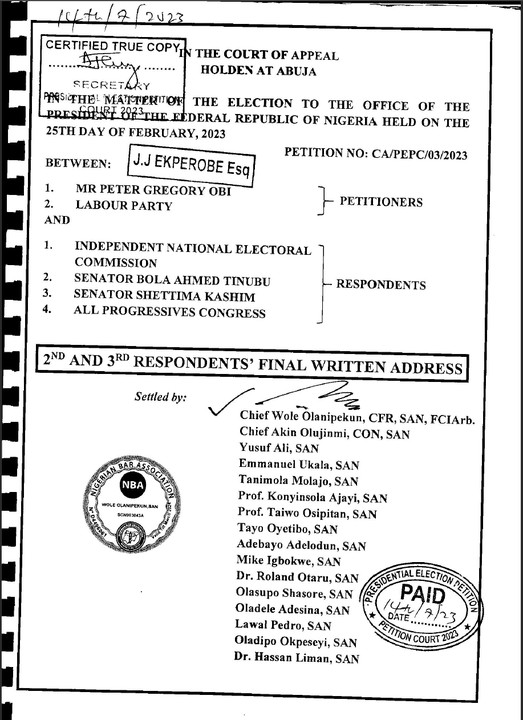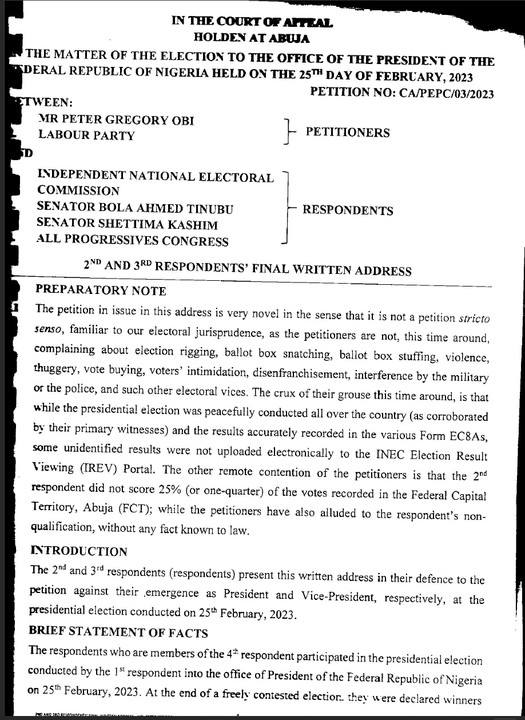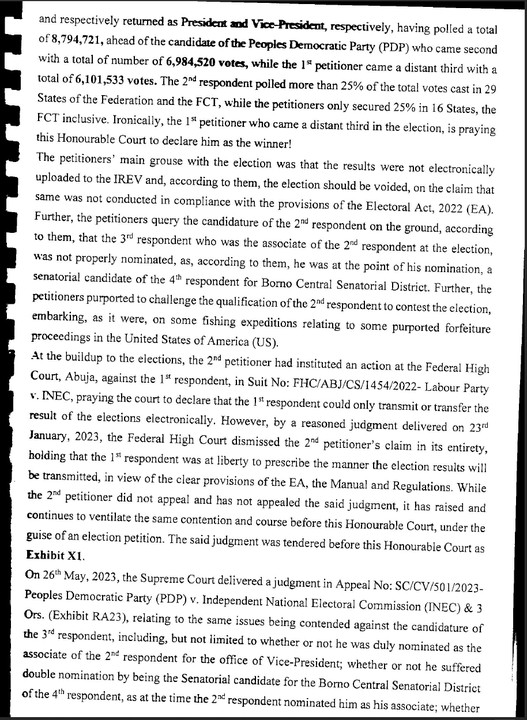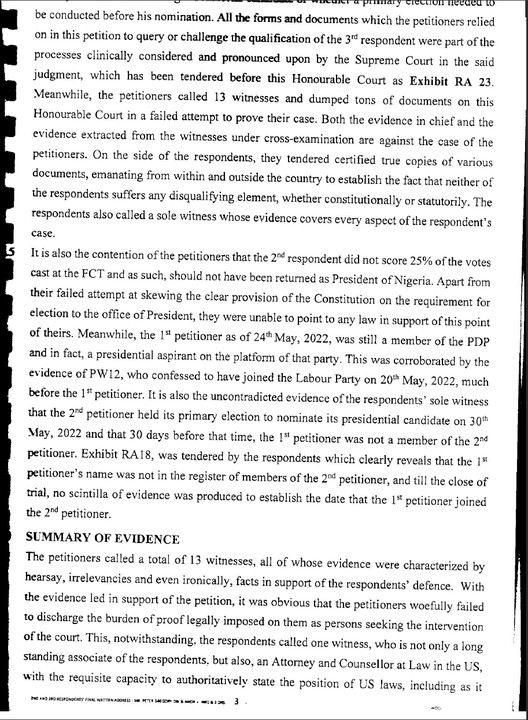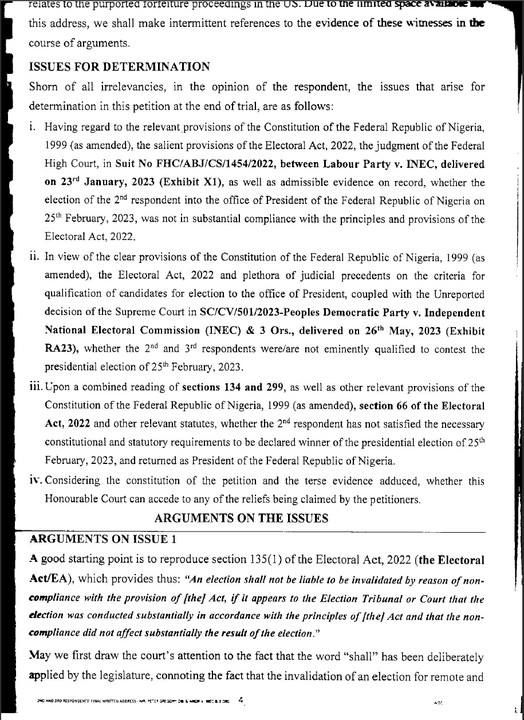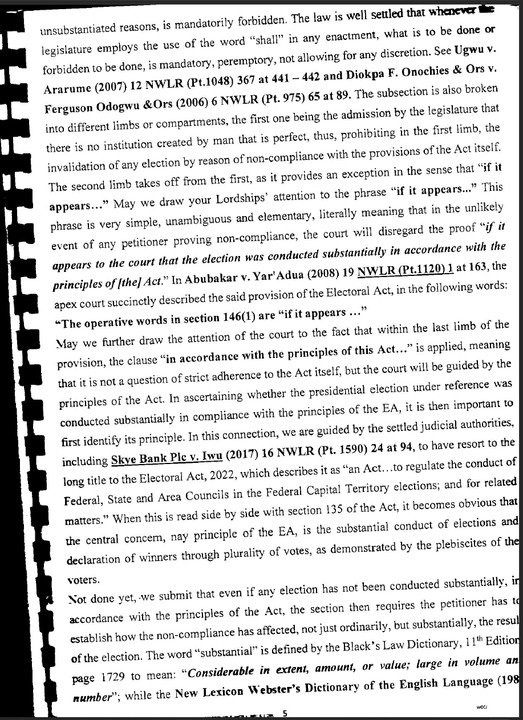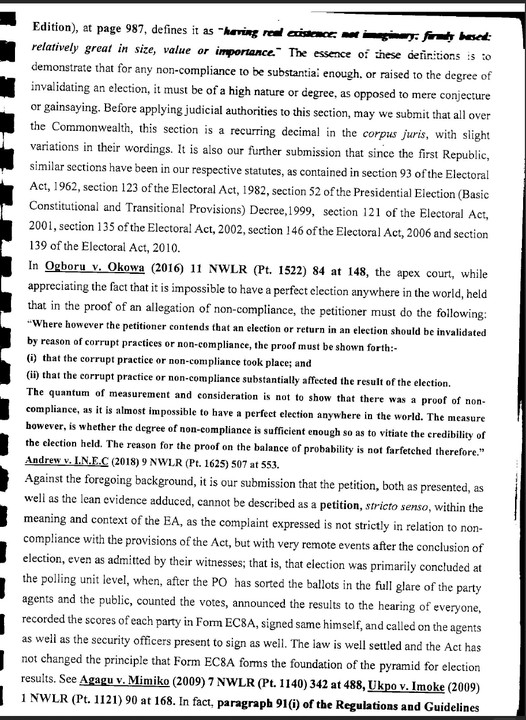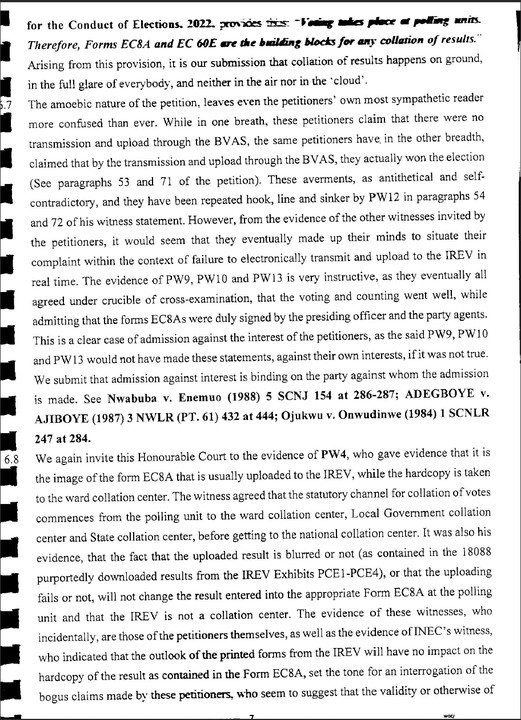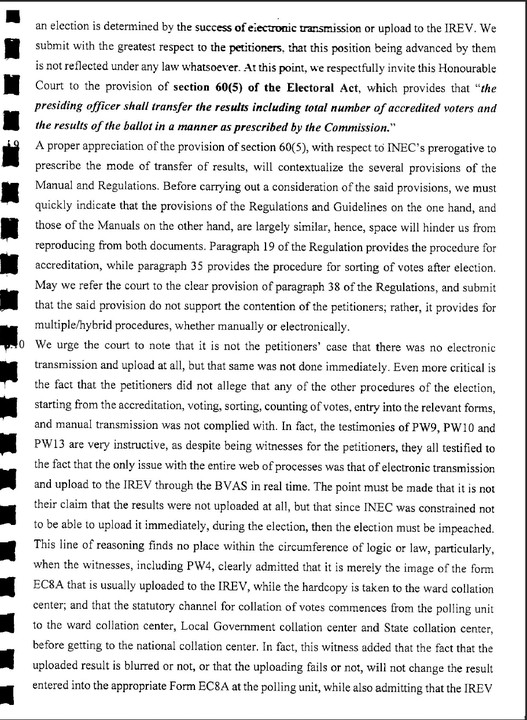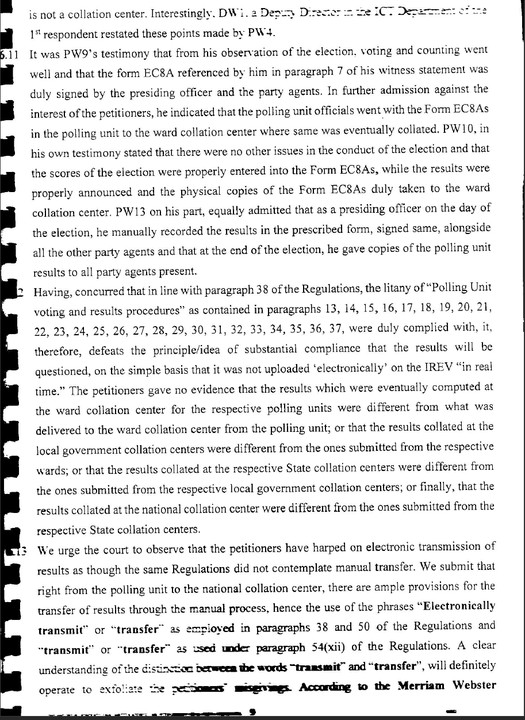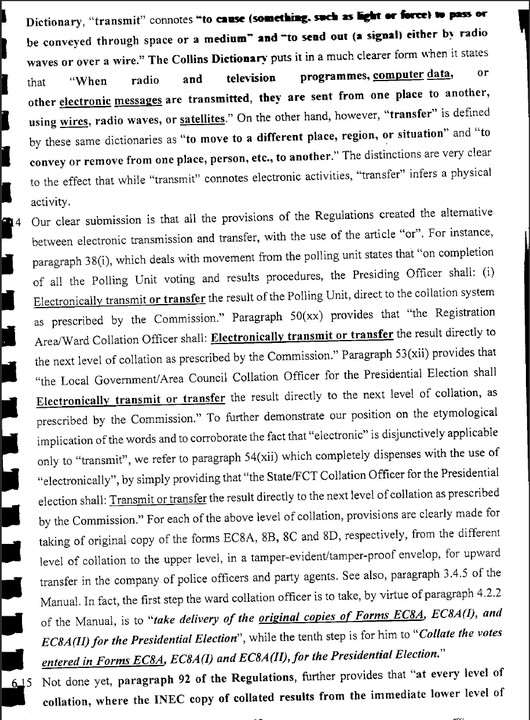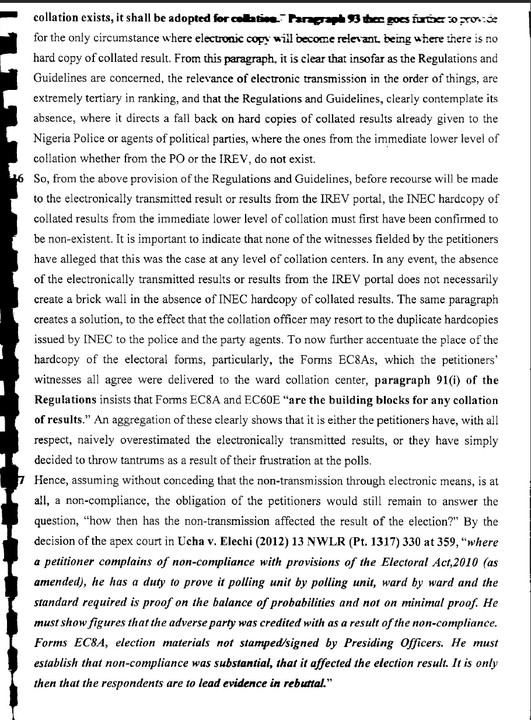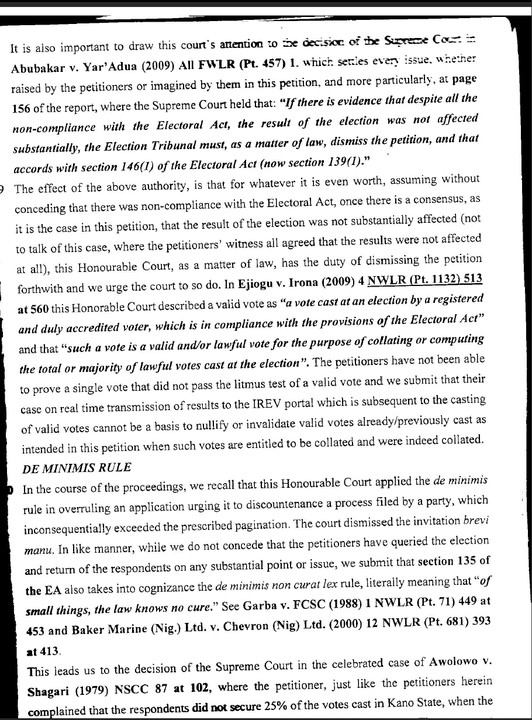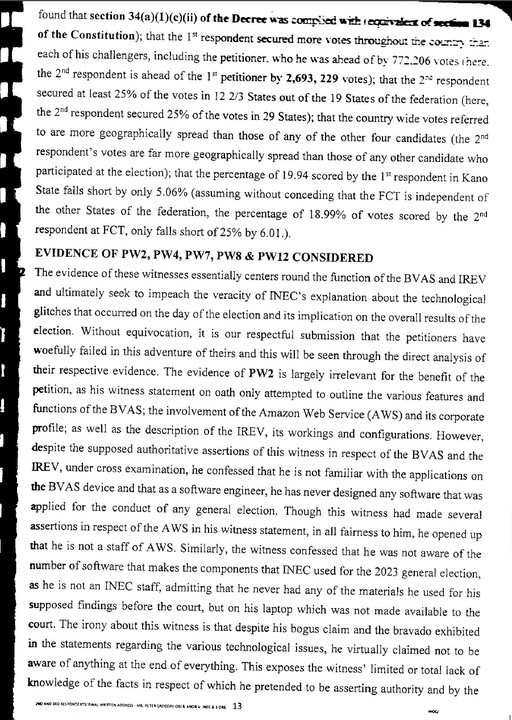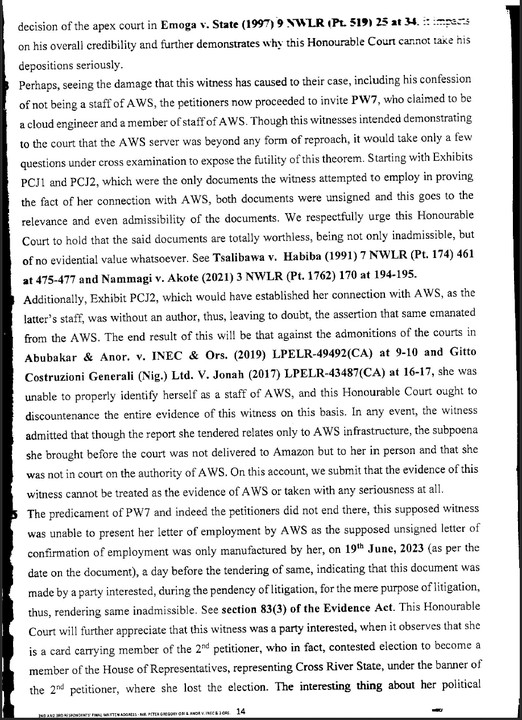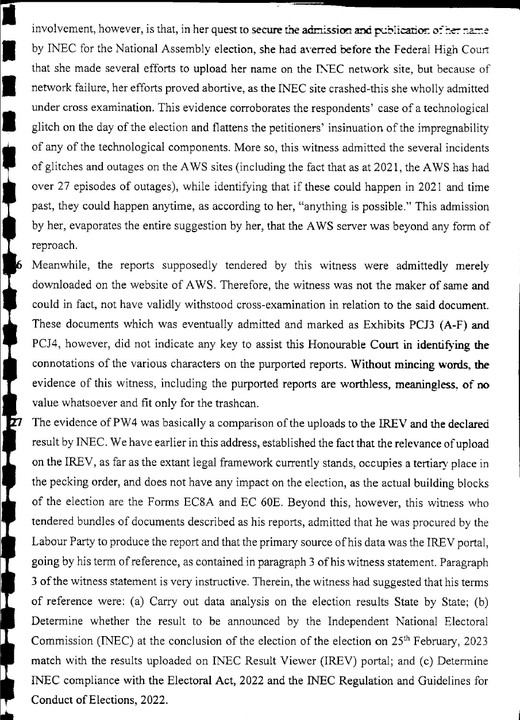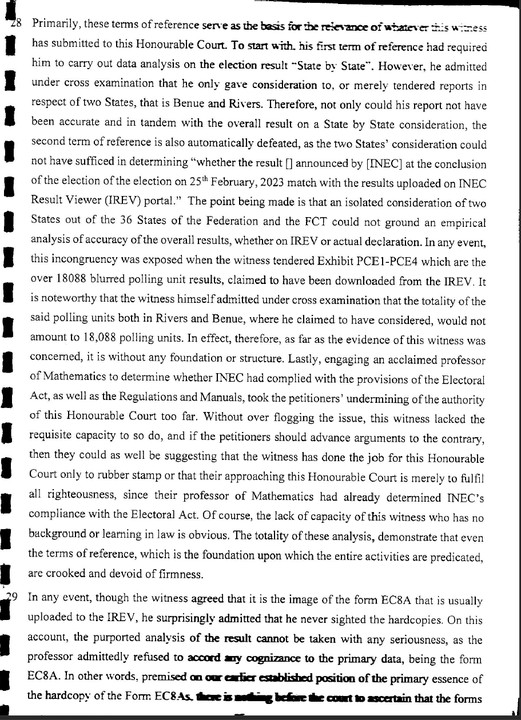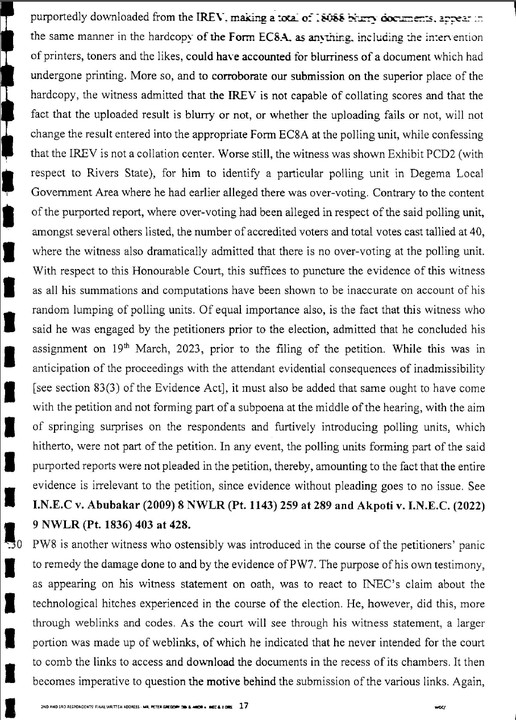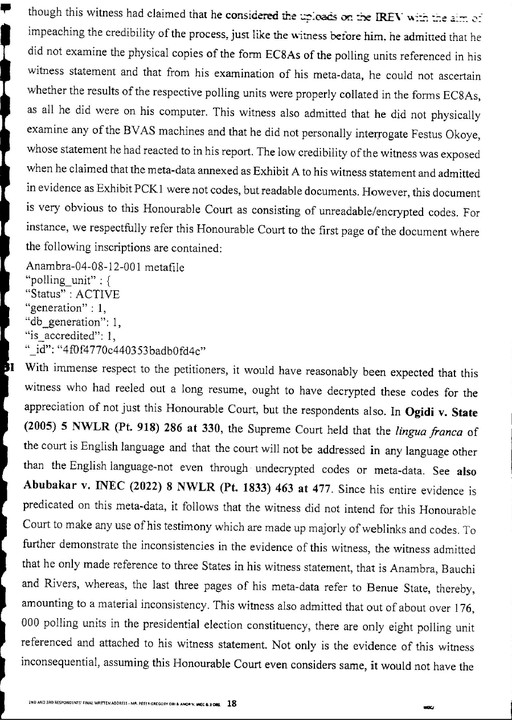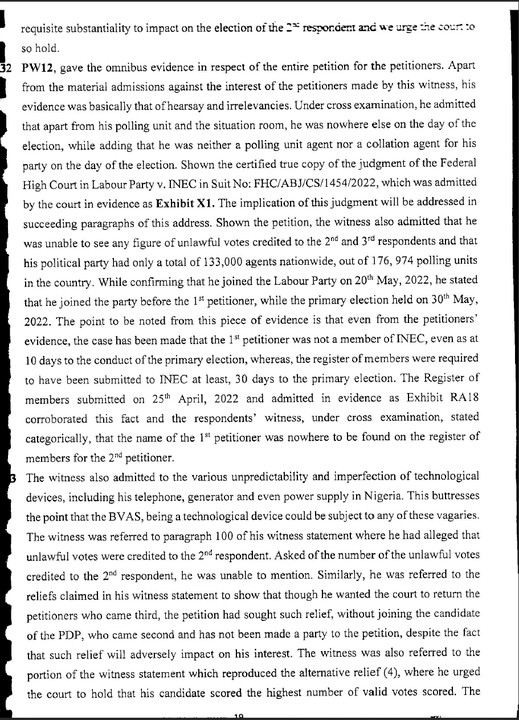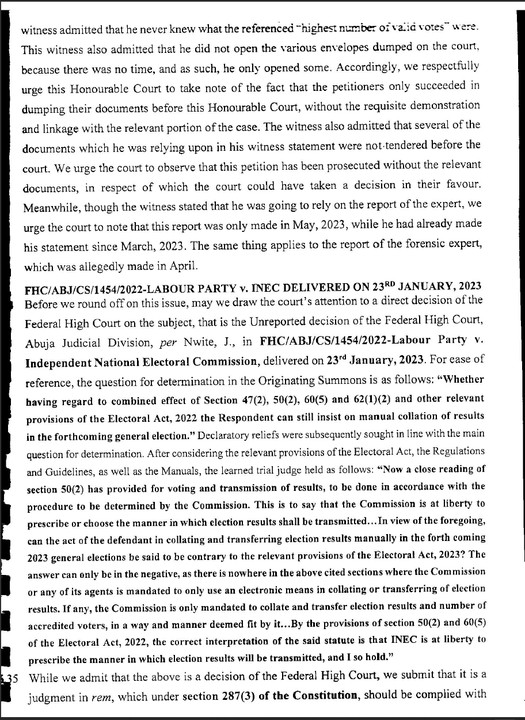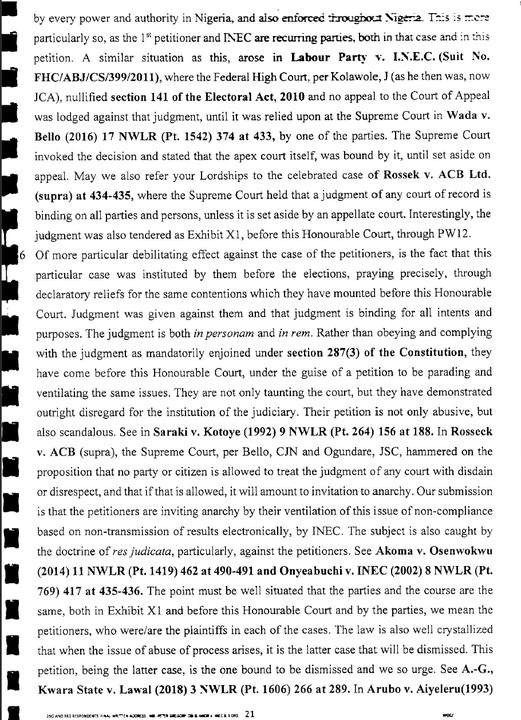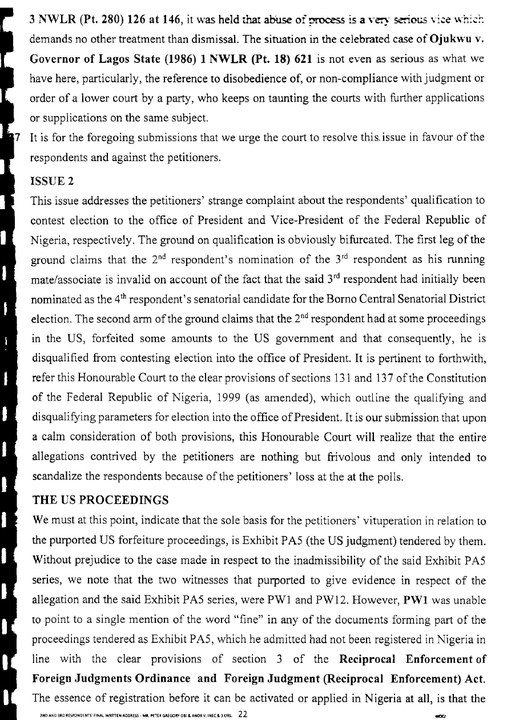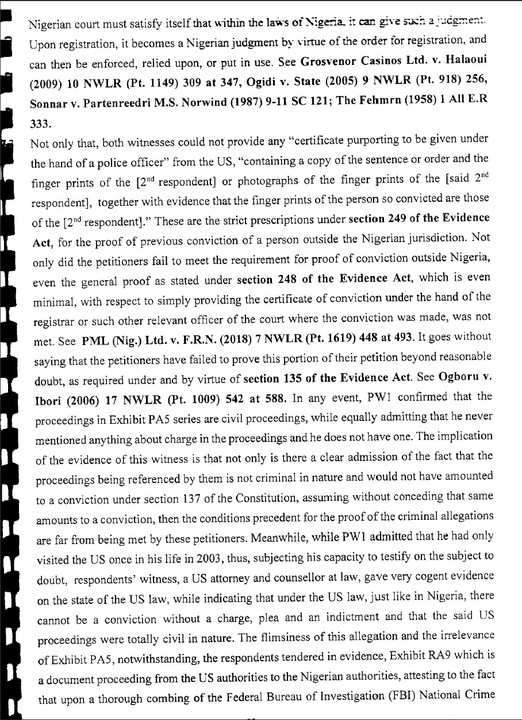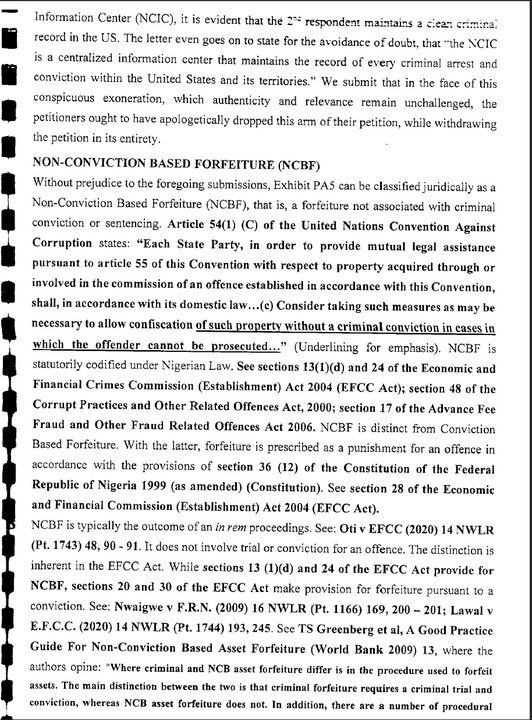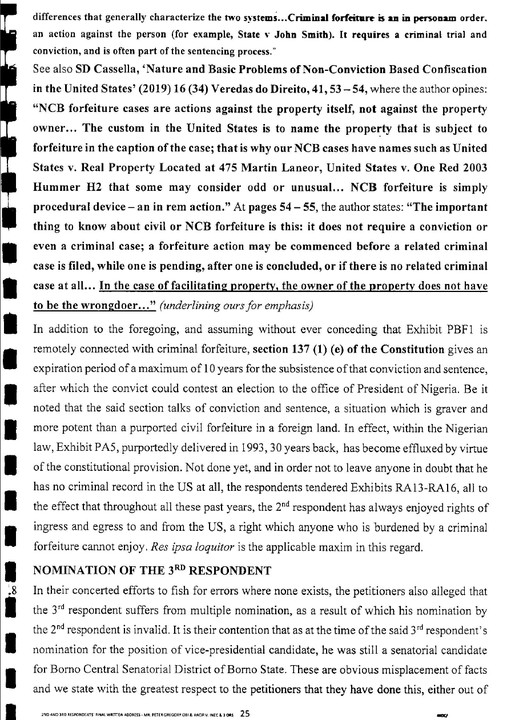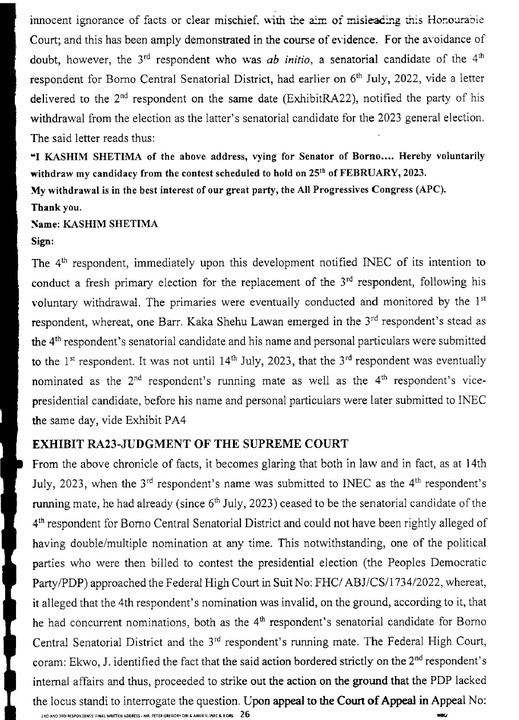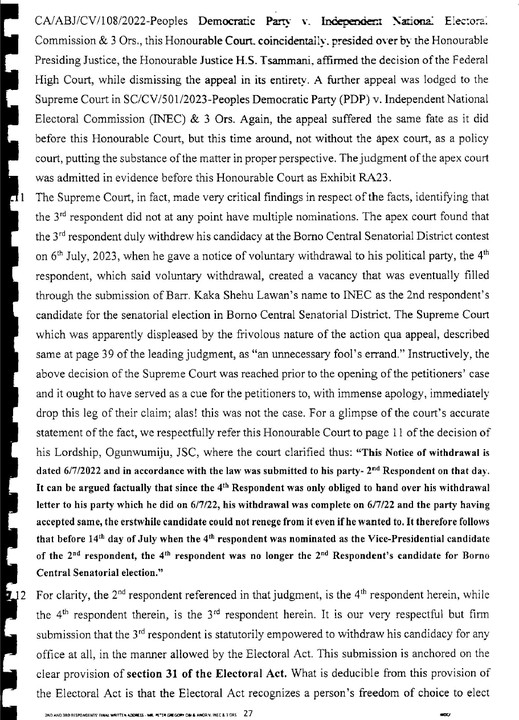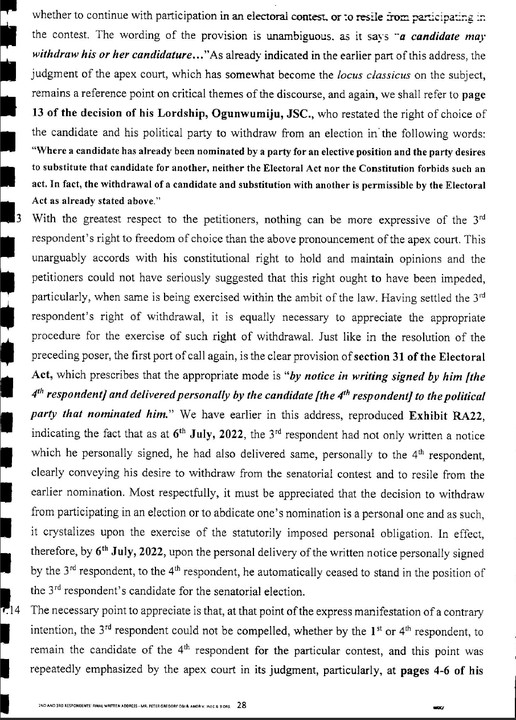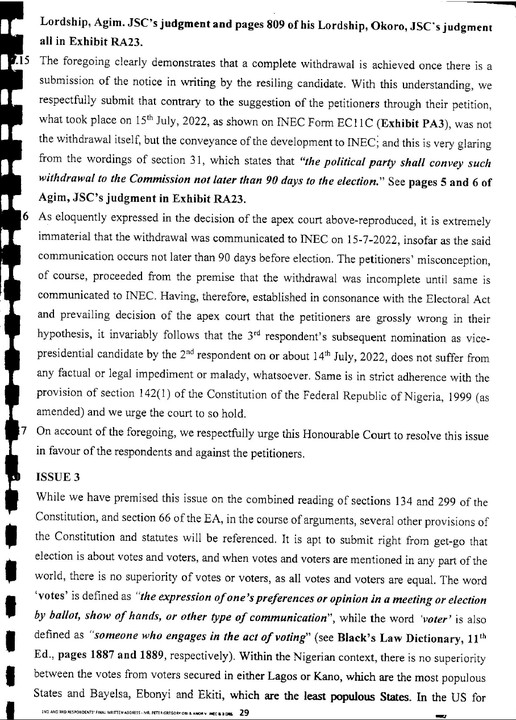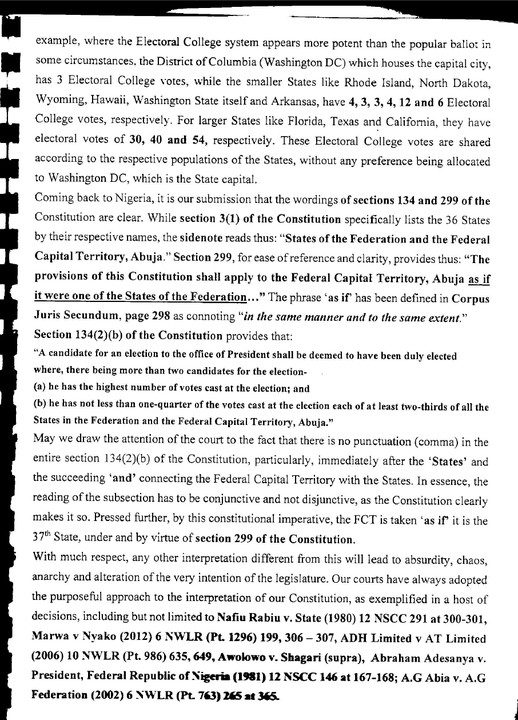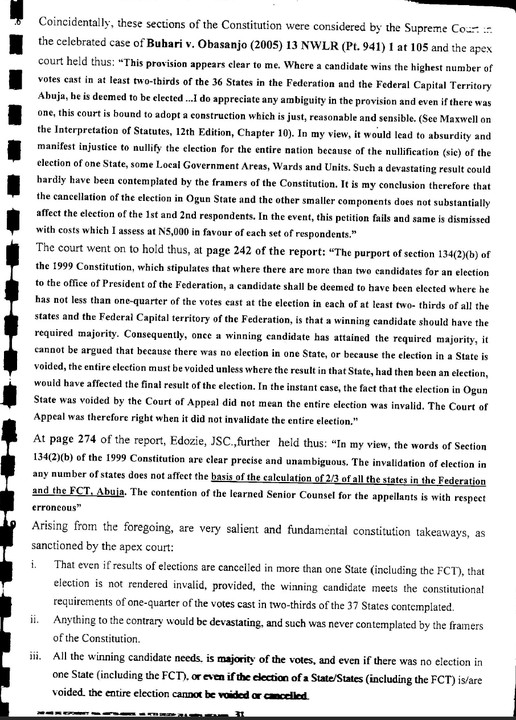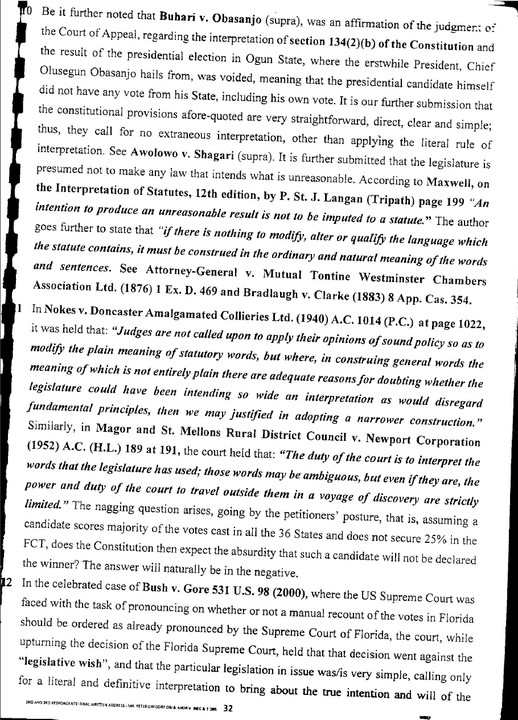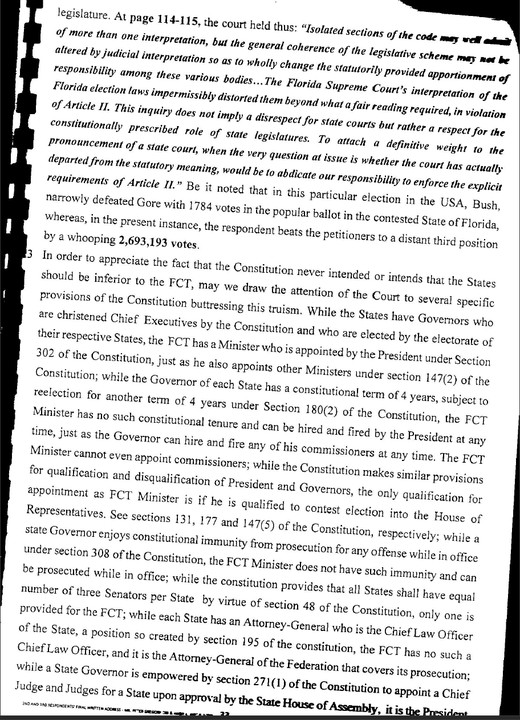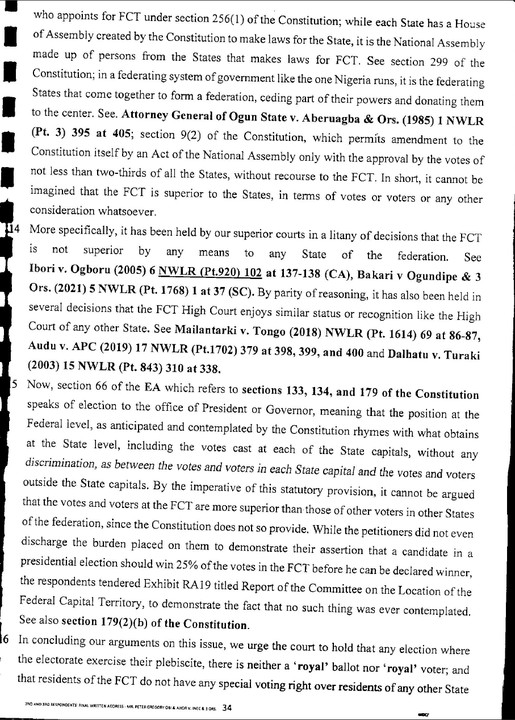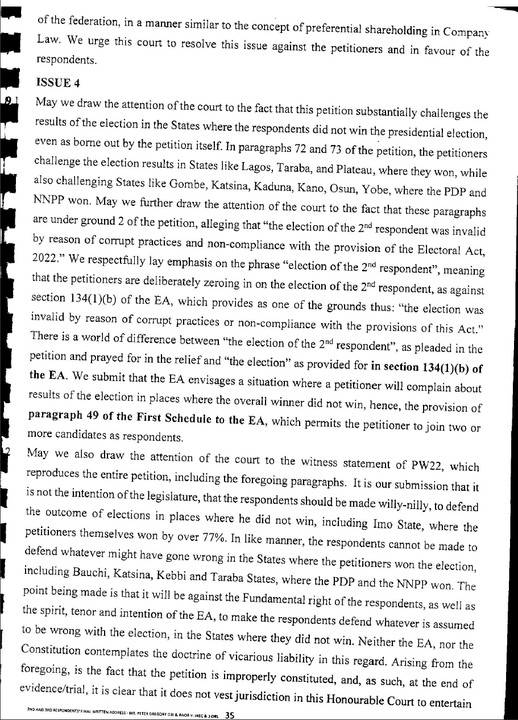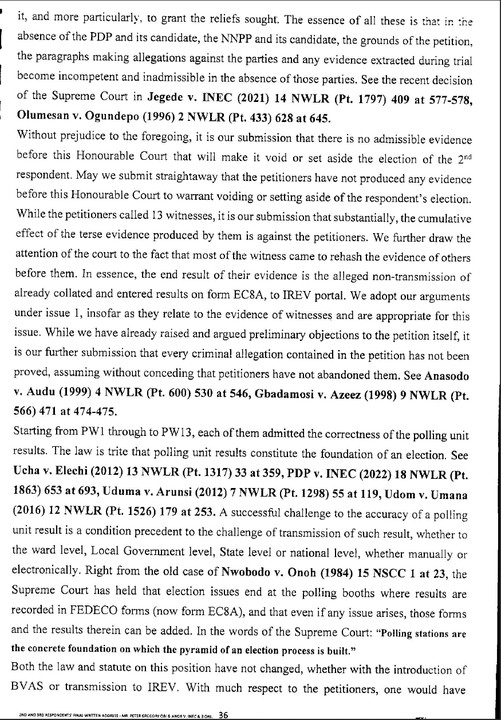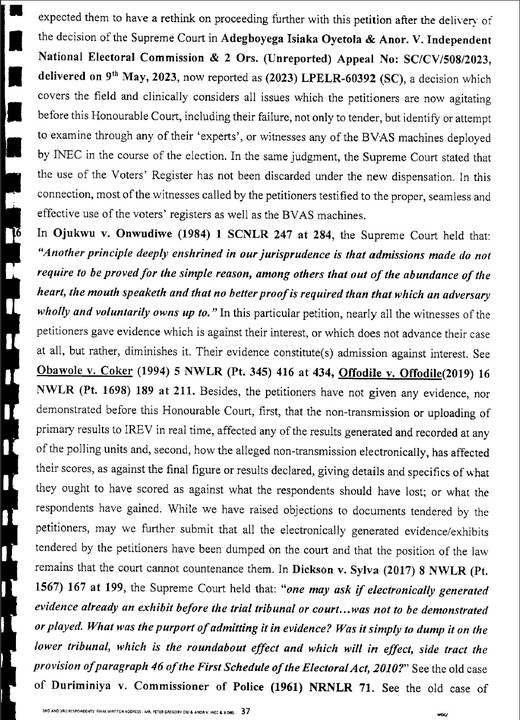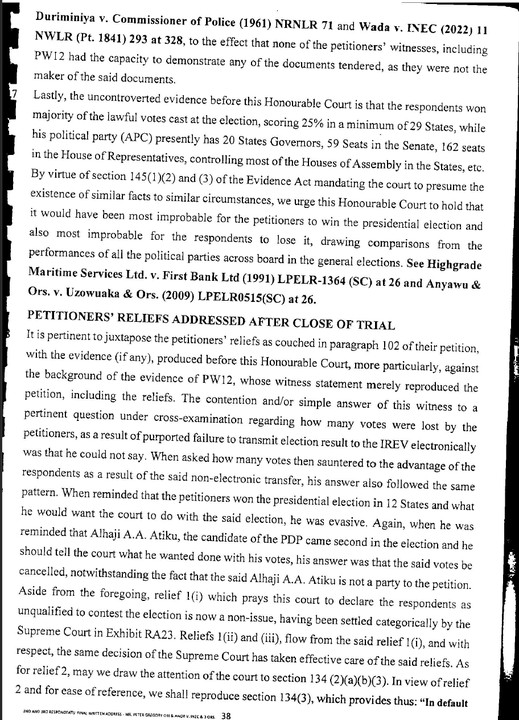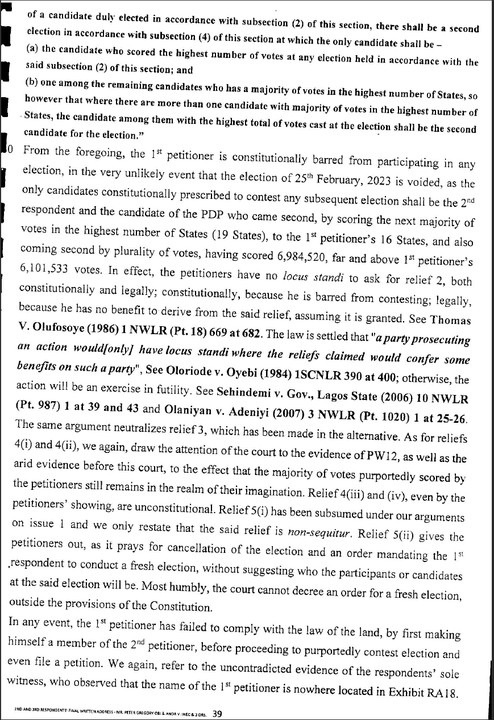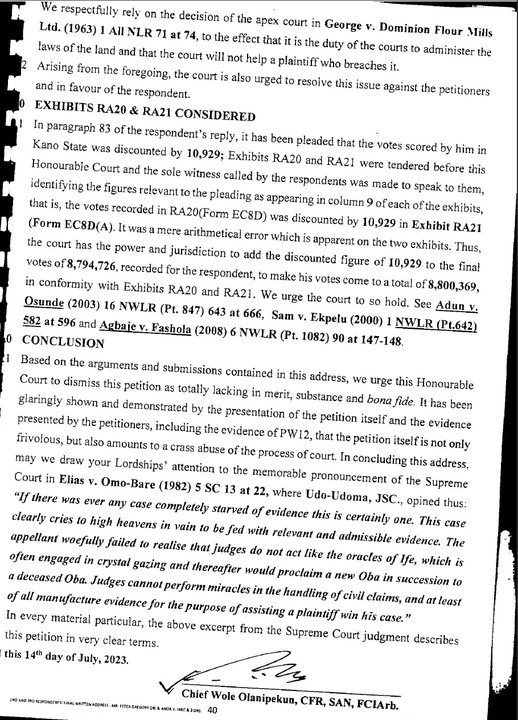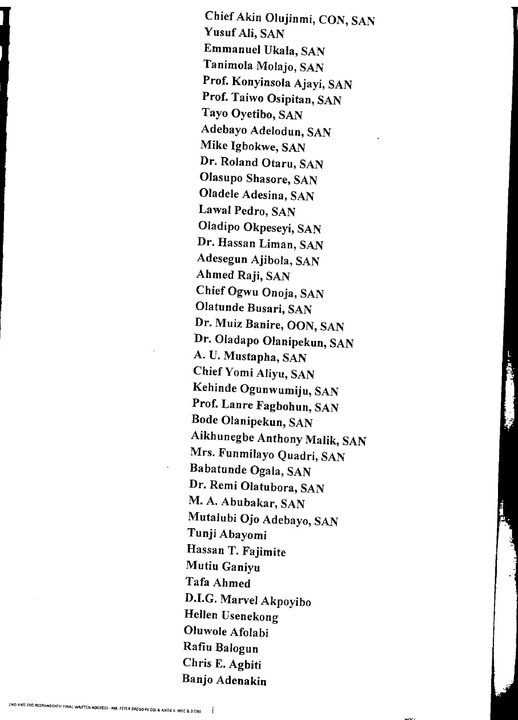The 2nd and 3rd respondents (President Bola Tinubu and Vice President Kashim Shettima) in the the pending case at the 2023 presidential election petitions tribunal sitting at the court of appeals Abuja have filed their final written address.
The forty-one pages address is reproduce here, you can download and read.
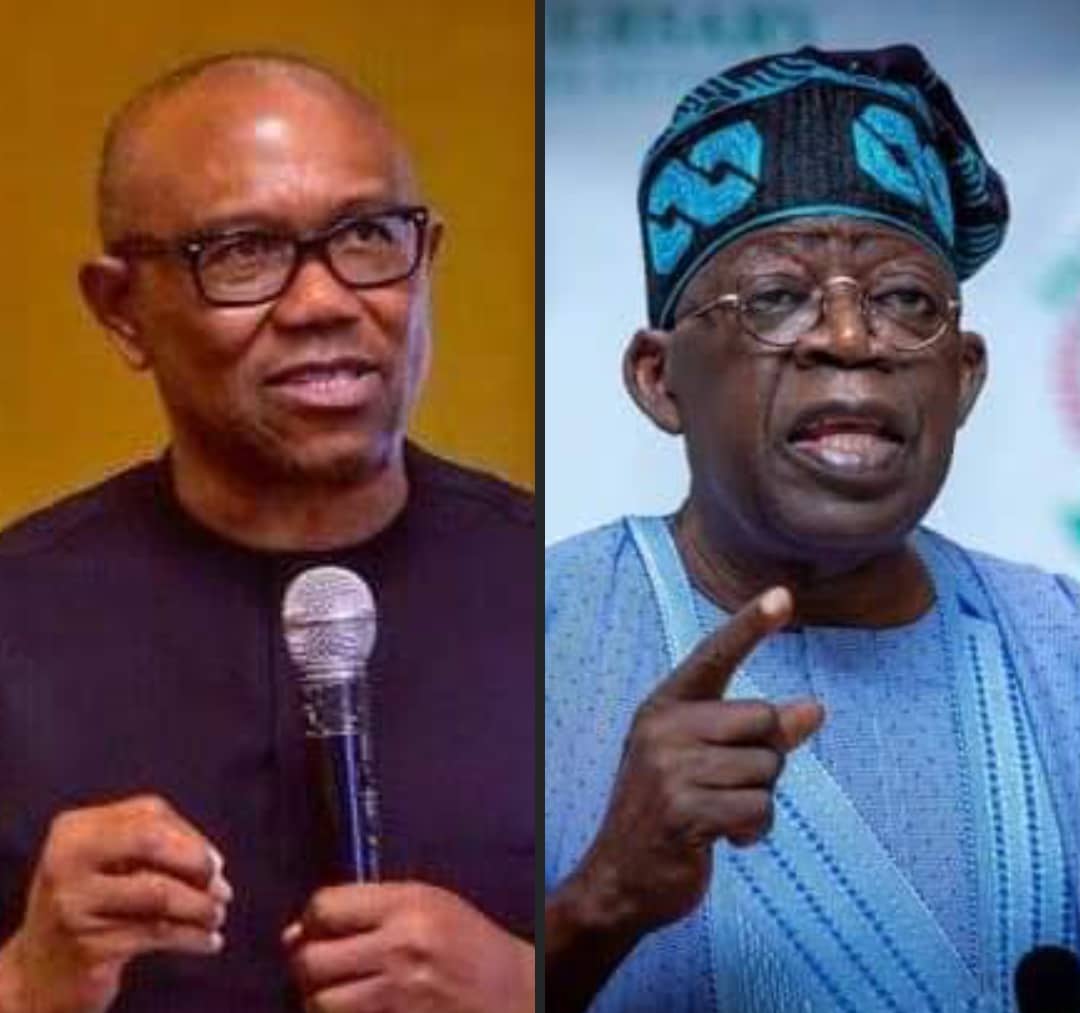
Scroll down to see the final written address.
Meanwhile,the ruling All Progressives Congress and President Tinubu had last week closed their defence barely after they opened it, in two separate petitions challenging their victory at the February 25, 2023 presidential poll. The question is, has the evidence of the sole witness done substantial justice in defence of the petitions? Alex Enumah reports.
Whether the task before lawyers representing the Independent National Electoral Commission (INEC), President Bola Tinubu and the All Progressives Congress (APC), at the Presidential Election Petition Court (PREPEC), is simple or insurmountable is not certain. However, what is certain is that the job is truly not an enviable one. This is so because Tinubu’s continued stay in office as president squarely rest on their shoulders as well as the quality and evidence of witnesses presented in defence of their victory at the February 25, 2023 presidential poll.
The PREPEC had on June 23, adjourned to July 3 for the Independent National Electoral Commission (INEC), President Tinubu and the All Progressives Congress (APC) to open their defence in the petitions filed by Alhaji Atiku Abubakar of the People’s Democratic Party (PDP) and Mr Peter Obi of the Labour Party (LP).
Atiku and Obi are among three petitioners seeking the nullification of Tinubu’s election as president over alleged irregularities, corrupt practices and non-compliance with the electoral laws during the conduct of the last presidential election.
The other petitioner, the Allied People’s Movement ( APM) had closed its case two days earlier after calling only one witness to prove its claim that Tinubu ought not to be on the ballot over alleged double nomination of his running mate, Senator Kashim Shettima and one Kabir Masari, who was initially a “place holder” Vice President nominee.
Specifically, the APM in its petition marked: CA/PEPC/04/2023, is contending that the withdrawal of Kabiru Masari, who was initially nominated as the vice presidential candidate of the APC invalidated Tinubu’s candidacy in view of Section 131(c) and 142 of the 1999 Constitution, as amended.
However, after the APM closed its case, the respondents who took turn to cross examine the witness, announced that they would not be calling any witness in defence of the election but would rather rely on the May 26, 2023 judgment of the Supreme Court, which according to them, has put to rest every thing surrounding the nomination of the Vice President. Based on this, the five-member panel of the PREPEC led by Justice Haruna Tsammani then fixed July 14 for parties to adopt their final written addresses in the petition.
Meanwhile, Atiku and Obi before closing their individual petitions called in a total of 40 witnesses to substantiate their allegations against the February 25 presidential poll that returned Tinubu of the APC as president.
Atiku and Obi’s grouse is that INEC failed to transmit election results in real-time as promised by its Chairman, Prof Yakubu Mahmood. They also submitted that Tinubu ought not to be on the ballot over alleged perjury, discrepancies in his academic records in addition to alleged criminal forfeiture.
Atiku in his petition marked: CA/PEPC/05/2023, specifically told the panel that, “the non-compliance substantially affected the result of the election, in that Tinubu ought not to have been declared or returned as the winner of the election”.
Similarly, Obi in his petition marked
CA/PEPC/03/2023, insisted he and not Tinubu won the presidential election; accusing the electoral umpire of manipulating the scores recorded in the Bi-modal Verification Accreditation System (BVAS) machines, as well as falsifying figures at various collation centers across the country to favour Tinubu and APC.
To buttress their individual petitions and convince the justices to sack Tinubu as President, while Atiku called 27 witnesses, Obi called 13, including experts and INEC’s adhoc workers who acted as Presiding Officers during the election.
The testimonies of the witnesses among others are that INEC deliberately refused to comply with its guidelines requiring it to transmit election results real time, from the Bi-modal Verification Accreditation System (BVAS) to the INEC’s Results Viewing ( IReV) portals, adding that INEC’s claim of encountering some “technical glitches” while uploading the presidential election results was untrue.
The petitioners had brought in video evidence which was played before the panel showing Mahmood and INEC’s National Commissioner for Information and Voter Education, assuring Nigerians and the international community that there is no going back on electronic transmission of election results.
Besides the testimonies of the witnesses, the petitioners presented before the court bundles of evidence such as polling units’ results, wards’ results, local government areas’ results, states’ results as well as the final result, which they said INEC manipulated to make Tinubu president.
Many of the results tendered and admitted as exhibits were blurred. According to Professor Eric Ofoedu, a Mathematics Professor and witness of Obi, “over 18,000 result sheets uploaded to the IReV portal were blurred”.
He claimed the above fact was discovered at the end of his investigation and analysis of the February 25 presidential results uploaded on the IReV portal.
In addition, they brought in certified copies of Tinubu’s academic records, front page of Tinubu’s alleged Guinean passport and a notarized judgment of a United States Court which allegedly ordered Tinubu to forfeit the sum of $460,000 over alleged complicity in drug related offences and money laundering.
However, at the resumption of trial on July 3, specifically for the respondents to open their individual defence, they closed their defence shortly after opening it. While INEC and Tinubu called in just one witness each, APC opted to adopt the witness and evidence of Tinubu as its own defence against Atiku and Obi’s petitions.
The announcement of the closure of the cases of the respondents came as a surprise and shocking to some, especially those expecting colorful and exhilarating legal fireworks as was evident during the case of the petitioners.
Recall that INEC during the pre-hearing session indicated that it would call two witnesses to defend the election it conducted on February 25 which is being challenged by Atiku, Obi and the APM, while Tinubu and the APC planned 39 and 25 witnesses respectively. Even, if Tinubu and APC did not call up to half of the witnesses earlier planned, very few had expected they will call only just one witness to counter the 40 called by Atiku and Obi. Same expectations go for INEC who is at the center of the litigation.
A lot of persons had expected INEC to call in more and credible witnesses in defence of the general election which the European Union (EU) in its final report, released a few days ago described as disappointing for not being transparent, marred by irregularities, violence, intimidation, among others. Although, arguably, it is not the number of witnesses a party called in support of his or her case that determines the failure or success of the case. The point is whether the evidence of the sole witness is strong enough to invalidate that of the 27 called by Atiku or that of the 13 called by Obi; who testified of how INEC deliberately refused to transmit results electronically, falsified results at collation centers, insisted INEC’s claim of technical glitches were false.
Led in evidence by INEC’s lawyer, Mr Abubakar Mahmoud, SAN, the witness, Dr Lawrence Bayode, INEC’s Deputy Director, Information Technology (IT), told the court that the technical glitches which occurred during the uploading of the presidential election results were handled through their Cloud Trail Log downloaded from their account with the Amazon Web Service (AWS).
He explained that the Cloud Trail Log is a device used to monitor their account with the AWS. Bayode further claimed that the technical glitch or glitches did not affect actual scores of candidates in the election because once stored in the BVAS it remains intact. In addition, the witness informed the court that INEC “does not have a collation system”, hence the collation of the election results were done manually.
However, under cross examination by Atiku’s lawyer, Chief Chris Uche, SAN, the witness who claimed to have supervised the configuration of the BVAS, said the device does have an in-built mechanism to select or distinguish presidential election results from the National Assembly results conducted same day with same machines.
He also admitted that as at March 1, when INEC declared Tinubu as winner of the presidential election not all the results from the election had been uploaded unto the IReV.
Questioned further, the witness admitted that INEC did not file a formal report of the said glitches to AWS because they didn’t need to.
Although, Tinubu just like INEC called in just one witness to defend his victory at the poll; the evidence of the witness dwelt more on his qualification to contest the February 25 presidential election.
Led in evidence by Tinubu’s lawyer, Chief Wole Olanipekun, the sole witness, Senator Opeyemi Bamidele, dismissed all criminal allegations against Tinubu, stressing that a United States Report as far back as 2003 cleared Tinubu of any criminal allegations; be it forfeiture or drug related.
Speaking on the sum of $460,000, Tinubu was said to have forfeited to the United States over alleged complicity in drug deals, the senator who claimed to be a member of the Nigerian Bar and the New York bar, observed that the forfeiture was in respect of a civil suit rather than criminal. Bamidele pointed out that the court document relied upon by the petitioners did not contain any conviction or sentencing.
Meanwhile, the witness told the panel that a total of 10,929 votes that accrued to Tinubu and the APC in Kano were missing while transferring the results from INEC’s Form EC8D (state) to Form EC8D (A) national.
But under cross examination, Bamidele admitted not being both in Kano State and the national collation center during the collation of results, adding that he was not aware that the agent of the PDP at the National Collation Center, walked out of the venue and refused to sign the results sheet in protest of alleged rigging of the presidential election.
When questioned by Obi’s lead counsel, Dr Livy Uzoukwu, SAN, the witness who said he was relying on Report of the ECOWAS Election Observer Mission, however, disagreed with a portion of the report that condemned the incidents of killings of a labour party candidate in the south east.
He also admitted not having licence to practice law in the State of Illinois, where Tinubu was said to have forfeited the sum of $460,000.
When questioned on the issue of a presidential candidate securing 25% of votes cast in the Federal Capital Territory (FCT) before being declared winner, Bamidele, argued that such position was not true because the FCT is not just like any other state in the country and does have a special status. He submitted that INEC was right in declaring Tinubu who scored 25% in more than 30 states winner of the presidential election, adding that the Constitution did not mandate Tinubu to score 25% of votes in the FCT.
At the end of the cross examination of Bamidele, Olanipekun like Mahmoud suddenly closed his case, leaving the ball in the court of the APC. But, more surprising was the response of APC’s lawyer that they will not be calling in any witness in defence of the two petitions.
In the words of the APC’s lawyer, Prince Lateef Fagbemi, SAN, “We do not intend to whip dead horses”.
According to him, there was absolutely nothing to defend in the separate petitions of the Labour Party and the PDP because the evidence of Tinubu’s witness had done substantial justice to the matter.
While cross examining Bamidele as the third respondent, the witness had submitted that Tinubu’s election cannot be reversed on the strength of his forfeiture of $460,000, to the US. The witness in addition pointed out that Tinubu was not arraigned, indicted or sentenced for any criminal charges by any American Court. “As far as criminal indictment is concerned, Bola Ahmed Tinubu has a clean bill of health because he was never indicted and convicted by any American Court”, the witness said.
On the issue of dual citizenship, the witness who claimed to have known Tinubu for more than 35 years stated that he knows that Tinubu is a Nigerian citizen by birth.
“Having taken a sober reflection of the entire case, we have enough evidence and we are not calling any witness, we do not intend to whip dead horses, we announce the closure of the case of the 3rd respondent”, Fagbemi had submitted.
While the position of Fagbemi may appear to have justified the calling of just one witness each by the three respondents in their defence of the two separate petitions, how appropriate this decision is would only be best decided by the five-member panel of the Presidential Election Petition Court, when they give their verdict sometime in late August or early September when the 180 days provided by the Constitution to hear the petitions would have elapsed.
Stay with IgbereTV, Africa’s number one online community TV
